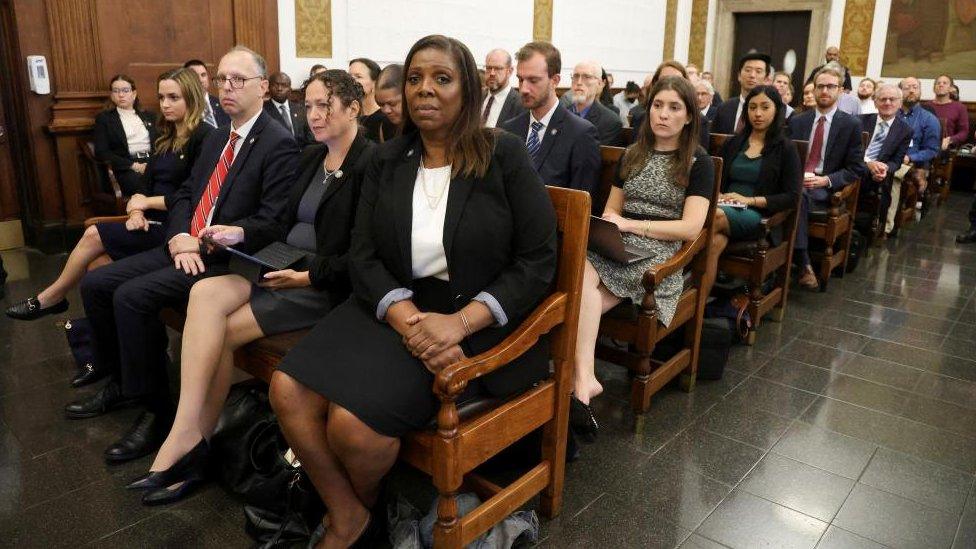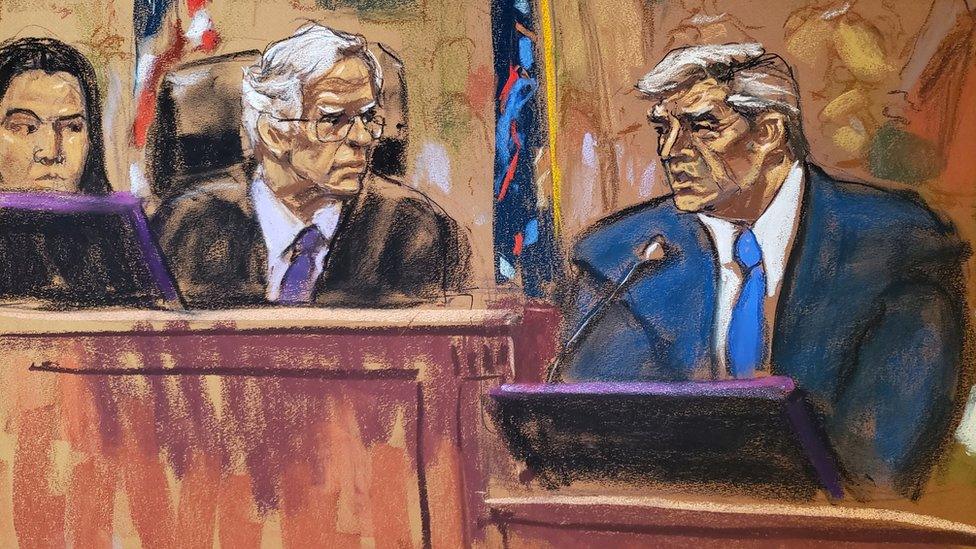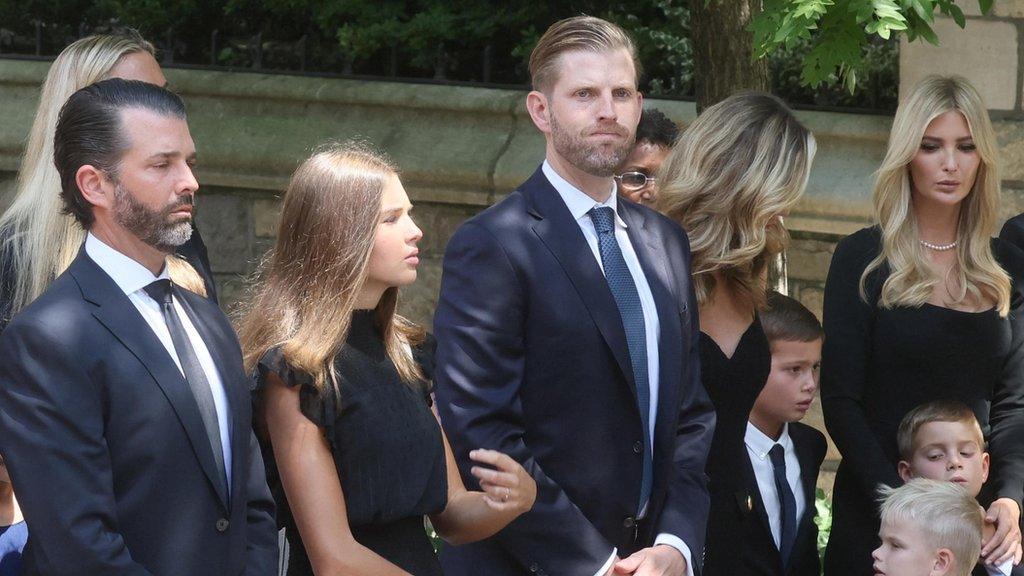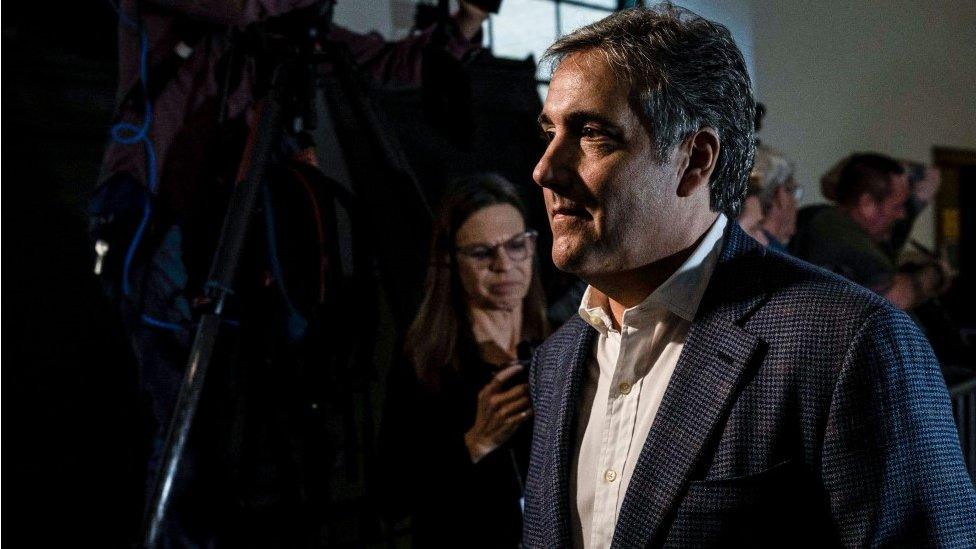Five things to know about Trump's New York fraud trial
- Published
Watch: Trump's New York fraud case explained... in 60 seconds
The vast business empire upon which Donald Trump made his name is on the line in a civil fraud trial in New York.
The former president, his two adult sons and the wider Trump Organization are accused of massively inflating the value of their properties by over $2bn (£1.65bn) in order to secure favourable loans.
Mr Trump has denied any wrongdoing, calling the case a sham.
Here are five things to know about the trial, which wraps up this week.
1. The stakes are high
A defeat would mark a significant blow to the real estate empire that propelled Mr Trump to national recognition long before he ran for the White House.
Those holdings constitute a significant chunk of his personal fortune and self-image. Earlier this year, Forbes Magazine estimated that his New York properties alone are worth $720m of his estimated $2.5bn.
Mr Trump has repeatedly pointed to his achievements in the New York real estate market as a source of personal pride.
In a 2015 interview with Bella NYC magazine, external, Mr Trump touted the "many great buildings" that he has built and owns as his greatest accomplishment outside of his family.
A victory for prosecutors would mean that Mr Trump and his company would have to pay a large fine - they recently increased their request to $370m - and be banned from doing business in New York, prising Trump Tower and the rest of his holdings from his control.
2. It involves his children
Two of Mr Trump's adult children - Donald Jr and Eric - are co-defendants in the case. The two took over the management of the Trump Organization in 2017, the year their father became president.
Like their father, both of Mr Trump's sons are accused of what Attorney General Letitia James has described as "persistent and repeated fraud" regarding their business. They also deny wrongdoing.
The lawsuit filed by Ms James, external cites multiple specific allegations against both Eric and Donald Jr, largely pertaining to allegedly fraudulent assessments of the value of real estate properties.

Eric Trump, along with his brother Donald Jr, are among the co-defendants in the case.
Eric Trump, for example, is accused of pushing for unapproved and "not feasible" developments at the sprawling Seven Springs Estate in Westchester County, as well as hiding its true value and fraudulently increasing the value of tax deductions stemming from it.
The lawsuit seeks to bar both men from serving as an officer or director in "any New York corporation or similar business entity" registered or licensed in the state.
The brothers and their father took the stand during the trial.
Their sister Ivanka Trump also testified. She was originally defendant in the lawsuit as well, but an appeals court dismissed the case against her over the summer.
3. The central claim in case already settled
Before the start of the trial, the judge in the case, Arthur Engoron, ruled that Mr Trump had misrepresented his wealth by millions of dollars.
His Mar-a-Lago estate in Florida was over-valued by 2,300% in one financial statement and his Trump Tower triplex was presented as three times its actual size, the ruling said.
The judge ordered that some of Mr Trump's companies be removed from his control. While the scope of this ruling is still unclear, it could mean that the Trump Organization could be forced to hand over control to a court-appointed receiver, or ultimately have to sell some of its most iconic landmarks.
The trial has focused on six other claims made in the lawsuit, including falsification of business records, insurance fraud and conspiracy.
4. No jury, one judge and one attorney general
The trial is a bench trial, meaning that the ultimate decision on whether the co-defendants are liable and any damages or penalties rest on Judge Engoron alone.
While Mr Trump, a Republican, has pointed to a lack of jury as evidence that the trial is unfair, Judge Engoron has said his team never asked for a jury.
Judge Engoron and Ms James - both Democrats - sparred with Mr Trump and his legal team over the course of the trial.

Mr Trump has repeatedly attacked New York District Attorney Letitia James (centre)
Mr Engoron imposed a gag order on Mr Trump, ordering him to refrain from public statements about court staff. And after Mr Trump said that a court clerk was "very partisan", the judge fined him $10,000. Mr Trump claimed that he had been referring to his former lawyer Michael Cohen, who testified against him.
Earlier in the trial the judge imposed a $5,000 fine, also for violating the gag order.
The former president has repeatedly called both Judge Engoron and Ms James "crazy" and "deranged" and in Ms James' case, a "racist", conducting a politically motivated witch hunt.
5. This is one trial of several he faces
This civil case is one of several ongoing legal battles the current Republican presidential frontrunner is facing.
He is also facing three criminal indictments.
Two relate to his alleged efforts to overturn the results of the 2020 presidential election and another to false accounting over hush money.
A fourth case sees Mr Trump facing 40 criminal charges over his alleged mishandling of classified material after he left the White House.
He also has been sued again by writer E. Jean Carroll, who won a $5 million lawsuit against him last year. The trial for the new lawsuit is set to begin Jan. 16.
He denies all the charges.
Related topics
- Published25 October 2023

- Published2 November 2023

- Published25 October 2023

- Published22 March 2024
